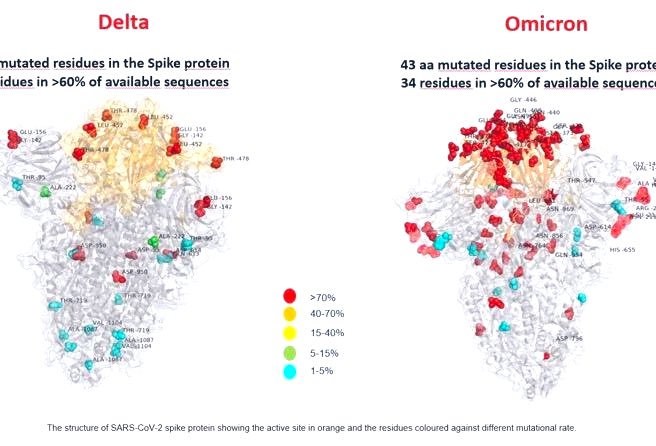First photo of omicron released, WHO shares update on Covid variant: 10 points

The World Health Organization on 26 November designated the covid variant B.1.1.529, named Omicron, a variant of concern. Researchers around the world are conducting studies to better understand many aspects of Omicron. Meanwhile, the prestigious Bambino Gesu hospital in Rome produced the first “image” of the new strain and confirmed that there were many more mutations than seen in the Delta strain.
On Omicron, the team of researchers, however, said “this does not automatically mean that these variations are more dangerous, just that the virus has further adapted to the human species by generating another variant”.
The WHO in an update said it is not yet clear whether Omicron is more transmissible (e.g., more easily spread from person to person) compared to other variants, including Delta.
“The number of people testing positive has risen in areas of South Africa affected by this variant, but epidemiologic studies are underway to understand if it is because of Omicron or other factors,” the agency added.
The WHO also said “it is not yet clear whether infection with Omicron causes more severe disease compared to infections with other variants, including Delta.
“Preliminary data suggests that there are increasing rates of hospitalization in South Africa, but this may be due to increasing overall numbers of people becoming infected, rather than a result of specific infection with Omicron,” the WHO said.
The WHO also said there is currently no information to suggest that symptoms associated with Omicron are different from those from other variants.
But preliminary evidence, WHO said, “suggests there may be an increased risk of reinfection with Omicron (ie, people who have previously had COVID-19 could become reinfected more easily with Omicron), as compared to other variants of concern, but information is limited. More information on this will become available in the coming days and weeks.”
WHO said it is working with technical partners to understand the potential impact of this variant on our existing countermeasures, including vaccines. “Vaccines remain critical to reducing severe disease and death, including against the dominant circulating variant, Delta. Current vaccines remain effective against severe disease and death,” it added.
The widely used PCR tests, WHO said, continue to detect infection, including infection with Omicron, as we have seen with other variants as well. “Studies are ongoing to determine whether there is any impact on other types of tests, including rapid antigen detection tests.” (With Agency Inputs)


